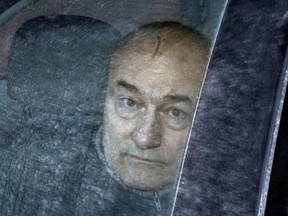Bush was handed the maximum sentence for the vicious beating and robbery.

Article content
Notorious killer Ian Bush has lost his appeal for a reduced sentence in the 2014 attempted murder of 101-year-old war veteran Ernest Côté, according to a decision published Monday by the Ontario Court of Appeal.
Bush, 68, is serving three concurrent life sentences for the horrific murders of retired tax court judge Alban Garon, his wife, Raymonde, and their friend, Marie-Claire Beniskos, who were hogtied, severely beaten and suffocated to death inside their luxury condo on June 30, 2007, in a crime that shocked the city and baffled investigators for years.
Advertisement 2
Story continues below
Article content
Article content
Police cracked the cold case after a 2014 home invasion that mirrored the killings seven years earlier, with Bush using fake City of Ottawa identification to gain access to Côté’s secure building. Investigators matched DNA left by Bush at both crime scenes.
Bush filed two appeals through his lawyers last month — one seeking a new trial on the first-degree murder charges and another appeal, launched two days later, that sought a reduced sentence for the attempted murder of Côté.
He was convicted of the three murders in May 2017 after a jury took a mere 90 minutes to deliberate; he was convicted of Côté’s attempted murder in December 2017.
Bush was handed the maximum sentence — two concurrent life sentences with no chance of parole for 25 years — for the vicious beating and robbery of Côté, a decorated Second World War veteran who passed away of unrelated causes months after the attack.
In a hearing in March, Bush’s appeal lawyers, Mark Halfyard and Samantha Bondoux, argued the presiding judge made an error in allowing a prejudicial “similar fact” application during the 2017 attempted murder trial.
Advertisement 3
Story continues below
Article content
His legal team also argued the judge, Superior Court Justice Robert Beaudoin, made an “error in principle” during his sentencing decision when he handed Bush two 25-year sentences for the attempted murder and robbery.
Bondoux said that sentence was “unfit” and called for a sentence in the range of 10-12 years.
In its decision Monday, a three-judge panel rejected Bush’s appeal in the Côté case, ruling the suggested sentence of 10-12 years would be “woefully inadequate” given the circumstances of the case.
Bush’s legal team argued the original trial judge made “material errors” in treating Bush’s lack of insight and the lack of any psychological explanation for his actions as aggravating factors when he imposed the maximum sentence.
Beaudoin, the original trial judge, listed those two factors as the last of ten factors that he considered to be aggravating in the attempted murder case.
Neither of those two factors “properly constitute aggravating factors… Nonetheless, they are both relevant to the future dangerousness of (Bush) and his prospects for rehabilitation,” according to Monday’s ruling from the Court of Appeal.
Advertisement 4
Story continues below
Article content
“I do not see that these two factors distorted (Beaudoin’s) analysis of the appropriate sentence for attempted murder,” according to the ruling from Justice Ian Nordheimer, which was endorsed by fellow appellate Justice Steve Coroza and Justice Jonathon George.
“The other factors that he listed, especially the age of the victim, that it was a home invasion, that it was carefully planned, and the fact of (Bush’s) earlier convictions for three murders, all justified a very severe sentence,” Nordheimer ruled.
“While I recognize that the trial judge imposed the maximum sentence, I cannot conclude that such a sentence was demonstrably unfit such as to warrant intervention by this court.”
The same three-judge panel is still considering Bush’s appeal in the triple-murder case.
His appeal lawyers argued the judge in that murder trial, Superior Court Justice Colin McKinnon, made an error in his assessment of a key piece of evidence.
Police linked Bush to the home invasion and the three unsolved killings when investigators matched his DNA left at both crime scenes. Police searched his home and seized a black leather bag, described in court as a “toolkit for murder,” which included duct tape, rubber gloves, knives and plastic bags.
Advertisement 5
Story continues below
Article content
Halfyard argued the presiding judge made an error in his assessment of the evidentiary value of the black leather bag, which he said was “undated” when it was found by police more than seven years after the murders and contained items that had “no connection” to the crimes.
“There’s no question in this case that the victims were brutally murdered and these killings were made all the more savage by the fact that all three victims were elderly and one was a former judicial officer,” Halfyard said in an appeal hearing last month.
He said the Crown’s evidence was “circumstantial” and labelled it “a case of Crown overreach that created an unfair trial.”
The cache of items in the black bag “made it appear that (Bush) was planning and maybe executing other home invasion robberies and murders, painting him with the brush of general propensity,” Halfyard said.
The inclusion of that evidence, and the judge’s failure to properly instruct the jury about the risk of prejudice the evidence would create, “tainted” the jury’s deliberations with “impermissible reasoning,” Halfyard argued.
No date has been set for a decision in that appeal.
ahelmer@postmedia.com
Recommended from Editorial
Article content


Comments